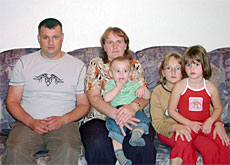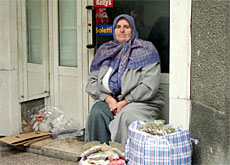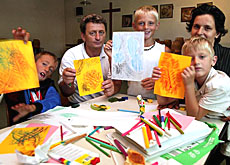Time running out for Vaud’s asylum seekers

Around 500 rejected asylum seekers in canton Vaud are anxiously waiting to find out whether they will be sent back to their home countries in the coming months.
The Mehmedovic family, who have been living in Lausanne for the past six years, fear they may be forced to return to Bosnia-Herzegovina this winter.
“We just don’t know what’s going to happen,” says 29-year-old Sabina Mehmedovic, a mother of three. “It is agonising for all of us not to know what the future holds.”
Her comments were echoed by Sabrie Iballi, a young Kosovar woman working as a waitress in Lausanne, who is also awaiting a final government decision regarding her fate in Switzerland.
“I have been living here for six years now and I love it,” Iballi told swissinfo. “My friends are here, my work is here, I have learned to speak French and I want to be a productive member of society.”
“I don’t know what I’ll do if I am told to go,” she added. “But I would rather die than leave Switzerland.”
Rejected
Iballi and the Mehmedovic family form part of a group of 523 asylum seekers in the canton whose residency applications were rejected by the federal authorities earlier this year.
Following a public outcry over the issue and pressure from the Swiss branch of Amnesty International, the Federal Refugee Office agreed to re-examine a total of around 170 of the requests, including those of Iballi and the Mehmedovic family.
So far, Bern has changed its mind concerning just one person, while final rejection notices were sent out to around 20 people last week.
Amnesty, which is part of a working group set up to re-examine the requests, has sharply criticised the procedure as “arbitrary”.
An additional 150 to 160 cases – which were expected to be re-assessed by the end of October – still need to be looked at, according to cantonal officials.
Iballi said a decision regarding her status may come as early as this week, while the Mehmedovic family expects to find out between now and mid-November.
Limbo
“We are living in day-to-day limbo,” says Sabina Mehmedovic, her eyes brimming with tears.
“The Swiss have promised to help us build a new house if we have to go back,” she adds. “But how will we find jobs or put food on the table, especially in the middle of winter?”
Sabina and her 30-year-old husband, Edin, came to Switzerland in 1998 – three years after Edin says he escaped the Srebrenica massacre, in which an estimated 7,000 Muslim men and boys were killed.
Before moving to Lausanne, the couple lived in the industrial Bosnian city of Tuzla, where they say they were “treated as squatters”. This, coupled with lingering ethnic tensions and the dismal economy, eventually prompted them to leave.
Advocacy workers say the family’s asylum request in Switzerland was rejected after the authorities questioned their claim to have been living in Srebrenica during the war.
Nightmares
In their modestly-furnished Lausanne apartment, the family – which includes one-year-old Osman, five-year-old Leila, and ten-year-old Semina – watches a grisly video of the aftermath of the massacre.
Semina, who was born in Bosnia but has no recollection of it, serves as her parents’ translator, since both speak only broken French.
She points to the television screen and explains that her father still has nightmares about Srebrenica.
“Both of my grandfathers disappeared,” she says. “My grandmothers are still alive but they are too old and poor to help us.”
“Sometimes my parents cry at night and I cry too, because I want to stay here and go to school with all of my friends,” Semina explains.
“If we are sent away, I will have to go to a Serb school kilometres away from Srebrenica.”
Sabina says she is also concerned about the high cost of medicine to treat Leila’s asthma condition, which she fears will worsen because of pollution in Bosnia and Herzegovina.
Choice
So far, the Swiss authorities have insisted that the family would have adequate access to treatment and that Leila’s health concerns were not serious enough to warrant allowing the family to stay.
Officials in canton Vaud are also quick to point out that rejected asylum seekers are free to choose where they want to live in their home countries.
“A person originally from Srebrenica can decide to go to Sarajevo instead,” said Frédéric Rouyard, a cantonal spokesman.
“There are no absolute rules,” he added. “We also plan to consult with each person and family individually to determine the best conditions for their return.”
Swiss-backed monitoring and assistance programmes are also in the works to help rejected asylum seekers on a local level.
But Amnesty says these efforts are unlikely to spare vulnerable returnees the emotional and physical trauma of readapting to life in their home countries after years in Switzerland.
“Amnesty believes that isolated Kosovar women should not be sent back before their chances of reintegration have been individually examined by local aid workers on the ground,” said the group in a statement.
“Also, refugees from Srebrenica cannot be sent back under the current circumstances, at the start of winter, until their living and employment situations have been sorted out,” it added.
swissinfo, Anna Nelson in Lausanne
The 1995 Srebrenica massacre was the worst of the Bosnian war.
An estimated 7,000 Muslim men and boys were killed in the five days after Bosnian Serb forces overran the town.
Around two million people fled during the three-year ethnic conflict; 250,000 died.
Ongoing ethnic tensions and the poor economy prompted many to leave after the war ended in 1995.
Around 500 rejected asylum seekers will soon find out when and if they are to be sent home from Switzerland.
The federal authorities are expected to re-examine around 170 refused residency requests, but so far Bern has only changed its mind concerning one person.
Many of the asylum seekers say they don’t know how they will survive if forced to leave.

In compliance with the JTI standards
More: SWI swissinfo.ch certified by the Journalism Trust Initiative


You can find an overview of ongoing debates with our journalists here. Please join us!
If you want to start a conversation about a topic raised in this article or want to report factual errors, email us at english@swissinfo.ch.